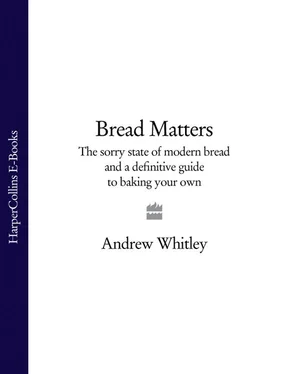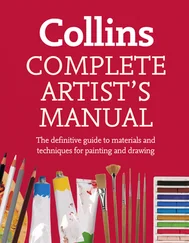Moreover, there is a wider concern that makes it hard to accept today’s scientific consensus on food additives. New chemicals are evaluated on a primarily toxicological basis: feed a great deal of your chosen substance to laboratory rats for a limited period and, if they don’t keel over and die, it can be presumed safe for humans. However rigorous, such procedures clearly do not catch the effects of long-term low-level exposure to novel compounds or altered processes, not to mention the ‘cocktail’ effect of combinations of active agents too numerous or unpredictable to model in the laboratory.
Enzymes and the great ‘processing aid’ scam
Enzymes are modern baking’s big secret. A loophole classifies them as ‘processing aids’, which need not be declared on product labels. Additives, on the other hand, must be listed in the ingredients panel. Not surprisingly, most people have no idea that their bread contains added enzymes.
An enzyme is a protein that speeds up a metabolic reaction. Enzymes are extracted from plant, animal, fungal and bacterial sources. Chymosin, for example, is the enzyme used to curdle milk for cheese making. It is either derived from rennet from a calf’s stomach or synthesised by genetic engineering. As you can seen from the table above, a whole host of enzymes is used in baking. Their status as processing aids is based on the assumption that they are ‘used up’ in the production process and are therefore not really present in the final product. This is a deception that allows the food industry to manipulate what we eat without telling us. In their own trade literature, enzyme manufacturers extol the ‘thermo-stability’ of this or that product – in other words its ability to have a lasting effect on the baked bread.
Manufacturers have developed enzymes with two main objectives: to make dough hold more gas (making lighter bread) and to make bread stay softer for longer after baking. As the table shows, many bakery enzymes are derived from substances that are not part of a normal human diet. Even if such enzymes are chemically the same as some of those naturally found in flour or bread dough, they are added in larger amounts than would ever be encountered in ordinary bread.
And now the safety of bakery enzymes has been radically challenged by the discovery that the enzyme transglutaminase, used to make dough stretchier in croissants and some breads, may turn part of the wheat protein toxic to people with severe gluten intolerance 4. This development is important because it suggests that adding enzymes to bread dough may have unintended and damaging consequences. Surely no one can seriously suggest that bakery enzymes should be omitted from bread labels.
I think we should be suspicious of bakery enzymes for four additional reasons:
Enzymes can be allergens and should be identified on labels in the same way as the major allergen groups.
Failure to label enzymes prevents people making informed ethical choices about what they eat.
There is a fundamental dishonesty in treating enzymes as though they had no effect on baked bread when this is patently why they are used.
Judgements about ingredients should take into account the whole food; an enzyme may be harmless in itself but may be used to make an undesirable product.
People have a right to know not just what is in their food but how it has been made. Some people need to know what is – or may be – in processed food because consuming the wrong thing may make them ill. Many food labels now contain advice designed to warn consumers not just about the actual content of the product in question but also about the possibility of contamination by potential allergens from the production environment.
But here’s a puzzle. Some allergens (peanuts, sesame seeds, gluten, lactose etc) have celebrity status, rightly, because of their potential for serious harm. Others, while known to specialists and sufferers, never make the charts. Amylase is one. Alpha-amylase is an enzyme naturally present in wheat in amounts that vary with variety and growing and harvesting conditions. Millers routinely add it to flour to make a more consistent product. It is also present in some compound bread ‘improvers’.
Amylases are known to cause allergic reactions in some people 5. There is an occupational health risk to bakery workers if enzymes get into the atmosphere, where they are breathed in and can cause asthma. But recent research has shown that up to 20 per cent of the allergenicity of fungal alpha-amylase can survive in the crusts of bread 6(perhaps we should revise the old adage about eating up your crusts; they may do more than make your hair curl). So, while amylase allergy is clearly not an issue on a level with nuts or gluten, it exists and may be exacerbated by the addition of fungal amylases to flour and bread.
It is not just a question of potential physical discomfort (or worse). As the controversy over genetically modified organisms (GMOs) in the late 1990s demonstrated, the way food is produced is of growing concern to many people – from the biological integrity of seeds, through farmers’ rights and animal welfare, to the impact on the physical and social environment. In other words, people may make moral judgments about provenance and production methods, even if these appear to have only a marginal bearing on the nature of the actual food they ingest.
For the food enzyme industry, all of nature is a chemistry set. No organisms are too exotic or repulsive to be investigated for possible active agents. As can be seen in the table above, the dough that goes into a loaf of standard factory bread may contain the strangest stuff – a reducing agent derived from animal hair or feathers, or enzymes from the pancreas of a pig. It may come as something of a shock to a Muslim or a Jew or a vegetarian that their daily bread is produced using animal by-products. It is possible that little or nothing of the original substance survives the baking process. But that isn’t the point. Bread has been made using an ingredient or process that some people find offensive. If you don’t know what’s gone into your bread – in the fullest sense of those words – how can you exercise any meaningful choice over whether to eat it or not?
‘Choice’, of course, is the mantra intoned by private business to promote product proliferation and by government to justify the intrusion of free-market economics into social provision. It is ironic therefore, that in their reluctance to declare what really goes into bread industrial bakers inhibit the exercise of informed choice and the regulatory authorities connive with a labelling regime that is geared more to commercial convenience than to true transparency.
We are entitled to ask why there is no requirement to tell people exactly what enzymes are put into our daily bread. European law is under review and may require processing aids to be treated like additives and declared on labels, but the new rule will not require bakers to give any more detail than the single word ‘enzymes’. What earthly good is that to consumers? Does it tell them that the enzyme added is alpha-amylase, to which some people are allergic? Does it alert them to the fact that the enzymes in question may include transglutaminase, which can turn wheat protein toxic for people sensitised to gluten? No, it does not.
In other words, we will move from the current state of total secrecy to one of bogus transparency where the information divulged is completely inadequate; it will be transparent only in the sense that you will be able to see right through to the information void on the other side. You don’t have to be a conspiracy theorist to wonder whether there’s something they don’t want us to know.
Читать дальше












